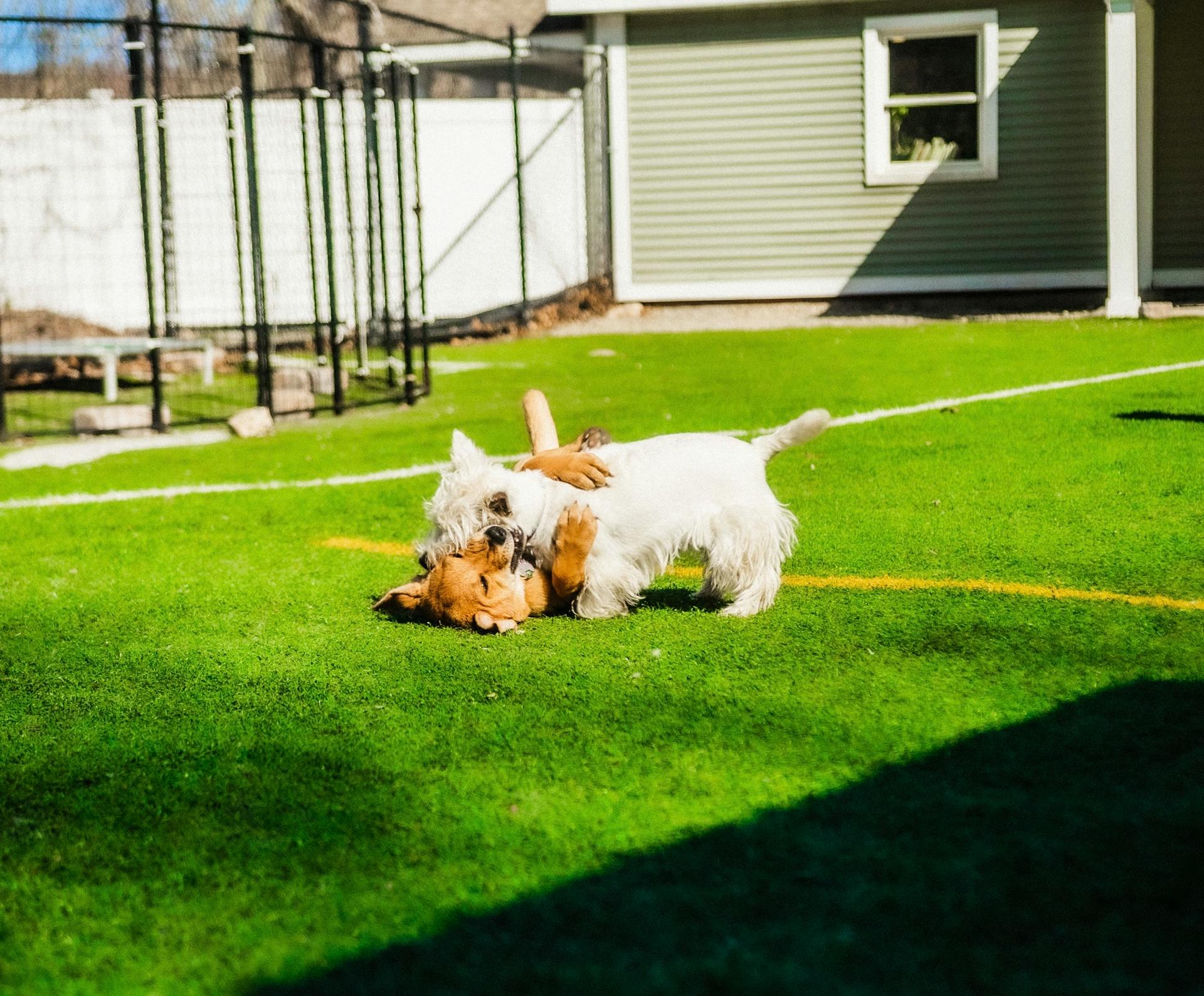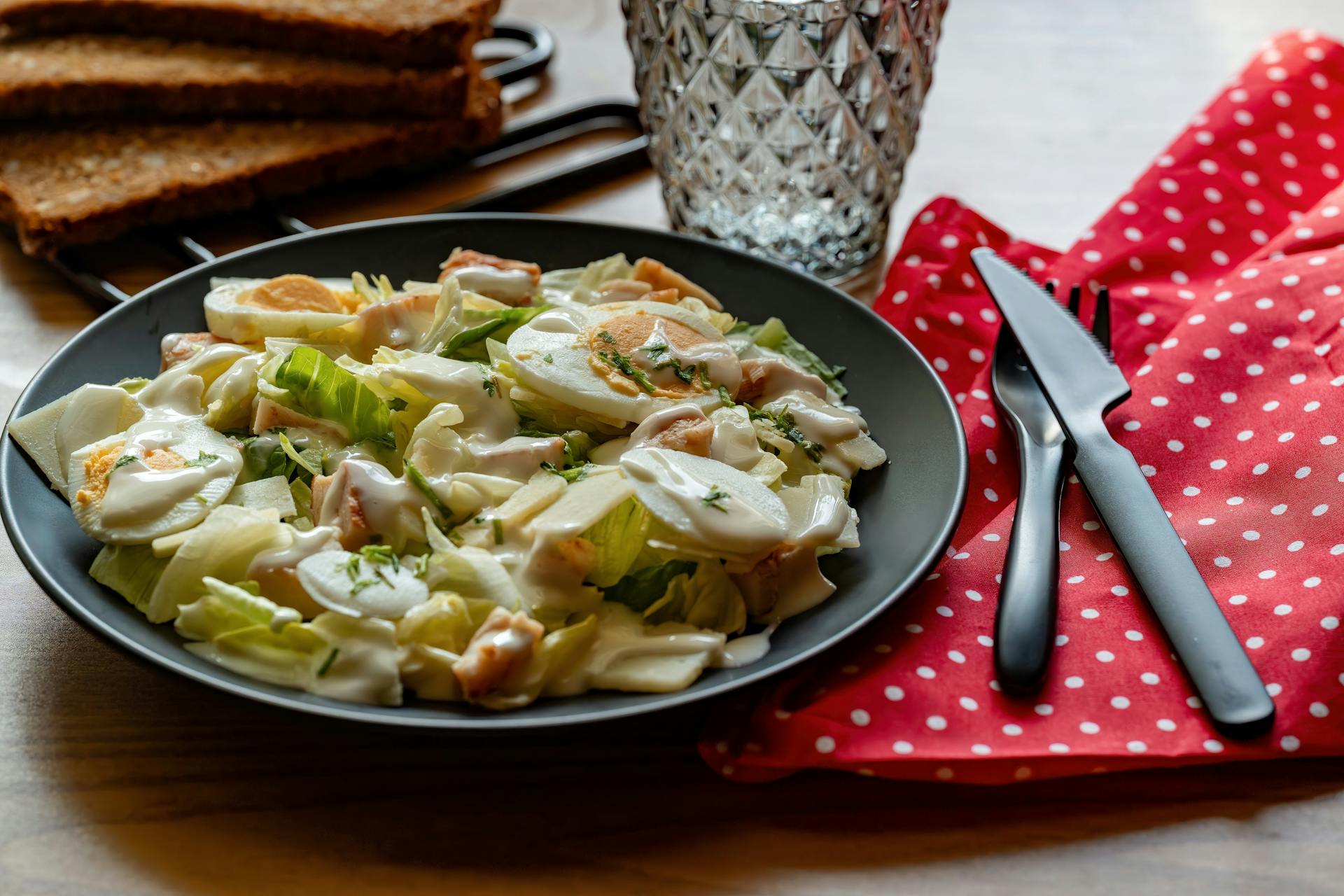
Some dog owners swear by feeding their furry friends human food, while others stick to commercial kibble. But is human food really better for dogs than commercial kibble?
Feeding dogs human food can be a more natural approach, as it allows them to eat what their ancestors would have eaten in the wild. This can be especially beneficial for dogs with food sensitivities or allergies.
One thing to consider is that human food can be higher in fat and calories, which can lead to weight gain if not managed properly.
Expand your knowledge: Pros and Cons of Feeding Dogs Human Food
Safety
Dogs can be poisoned by certain human foods, which can lead to serious health issues and even death.
Chocolate, for example, contains a compound called theobromine that can be toxic to dogs, even in small amounts. This can cause symptoms like vomiting, diarrhea, and increased heart rate.
Some human foods, such as onions and garlic, belong to the Allium family and can cause anemia in dogs due to their ability to damage red blood cells.
Intriguing read: Can Dog Food Cause Diarrhea in Dogs
Allergies
Dogs can have food allergies, and it's crucial to know what to look out for. The most common canine food allergens include beef, chicken, eggs, fish (or seafood), and dairy.
Some dogs may react severely to these allergens, so it's essential to be aware of the signs of an allergic reaction, such as itching, scratching, and digestive issues. If you suspect your dog has a food allergy, consult with a veterinarian for proper diagnosis and treatment.
The good news is that there are many safe and healthy human foods that dogs can eat, but only if you're aware of their feeding behavior and potential allergies.
You might enjoy: Can Dogs Develop Food Allergies
How Diet May Impact Your Dog's Health
A fresh diet filled with human-grade foods can have an immense wealth of health benefits for your furry friend. This is especially true when it comes to digestibility, as human-grade dog food is highly digestible.
Food that your dog struggles to digest can lead to vomiting, abdominal bloating, stomach pain, and poor nutrient absorption. This is why a fresh diet is so important.
Human-grade dog food contains a wider array of nutrients, including high-quality proteins, vitamins, and minerals. This variety of nutrients can help care for the ins and outs of your dog's health.
Variety is also key, as human-grade dog food offers a change from the same old meal day in and day out. This can help keep your dog engaged and interested in their food.
Good hydration is essential for your dog's overall health, and human-grade dog food can provide a high level of nutrients and hydration. This can help carry nutrients and oxygen to all the cells in the body.
Dogs with sensitive stomachs tend to fare better on human-grade dog food, which can help alleviate symptoms like nausea, vomiting, and diarrhea.
For more insights, see: Is High Protein Dog Food Good for Dogs
Human Food for Dogs
Human food can be a great addition to your dog's diet, and it's not just about sneaking them treats. Pumpkin aids digestion, making it a great occasional treat for dogs.
Take a look at this: My Great Pyrenees Won't Eat
Some human foods that are good for dogs include blueberries, which provide antioxidants that can help protect their health. Carrots are also a great option, as they're good for dental health.
These foods can be used in small amounts mixed with regular dog food, or as an occasional treat, and can provide health benefits for your furry friend.
Related reading: Foods for Dogs with Diabetes
Can Sugar, Artificial Sweeteners?
Sugar, artificial sweeteners, and other human foods that are high in sugar or artificial flavorings can be toxic to dogs. Dogs have a hard time metabolizing sugar and can experience a rapid spike in blood sugar levels.
Artificial sweeteners, like xylitol, can be especially toxic to dogs. Even small amounts can cause a rapid drop in blood sugar and even liver failure.
Most dogs will exhibit symptoms of sugar or artificial sweetener toxicity within 15 to 30 minutes of ingestion. These symptoms can include vomiting, diarrhea, lethargy, and seizures.
If you suspect your dog has ingested sugar or an artificial sweetener, it's essential to contact your veterinarian or a pet poison hotline immediately.
Good Enough? The Truth About
Pumpkin is a great addition to your dog's diet, aiding digestion and helping to prevent constipation.
Some human foods are perfectly safe for dogs to eat, and they can even provide health benefits. For example, blueberries are packed with antioxidants that can help protect your dog from cell damage and reduce the risk of chronic diseases.
Carrots are a crunchy and healthy snack for dogs, and they're good for their dental health too. They can help keep your dog's teeth clean and strong.
Pumpkin can be used as a treat or mixed in small amounts with regular dog food, and it's especially helpful for dogs with digestive issues.
Broaden your view: Can French Bulldogs Eat Pumpkin
What Can Dogs Eat
Cooked, unseasoned chicken, turkey, and beef are all great sources of protein for your dog, but make sure to remove all bones to reduce the risk of choking.
Chicken is the most balanced meat option, high in protein and low in fat, making it the healthiest type for canines.
Check this out: Boiled Chicken Water for Dogs
Cooked, unseasoned fish is another healthy treat for dogs, rich in protein and omega-3 fatty acids, but again, remove all bones to prevent choking hazards.
Pumpkin aids digestion, blueberries provide antioxidants, and carrots are good for dental health, making them safe and healthy treats for your dog.
The vast majority of vegetables are safe for dogs, including carrots, celery, green beans, peas, pumpkin, spinach, squash, and sweet potatoes, which can provide health benefits and be a nutritious addition to their diet.
However, it's best to avoid giving your dog garlic, onions, shallots, and chives, as they are toxic and can cause anemia and damage red blood cells.
Explore further: Dogs and Eating Carrots
What Proteins Can
Dogs can thrive on a variety of protein-rich foods, including cooked, unseasoned chicken, turkey, and beef. Make sure to remove all bones from these meats to prevent choking hazards.
Cooked chicken is a particularly healthy option, as it's high in protein but low in fat, making it the healthiest type of meat for canines.
Cooked, unseasoned eggs are another great protein source for dogs, providing a wealth of nutrients like protein, vitamin D, selenium, and riboflavin.
Fish is also a healthy protein option for dogs, but be sure to remove all bones to prevent choking hazards.
Worth a look: Cooked Food Diet for Dogs
Cooked Pumpkin
Cooked pumpkin is a healthy snack for dogs, providing fiber and beta-carotene that can help with digestion and improve their coat appearance.
It's also low in calories and fat, making it a great choice for dogs who are overweight or prone to weight gain.
Pumpkin can be used as an occasional treat or mixed in small amounts with regular dog food to provide a nutritional boost.
Dogs can enjoy cooked and chopped-up pumpkin as a healthy snack, and it's a great way to add some variety to their diet.
Mixing a little pumpkin with their regular food can help promote healthy digestion and support their overall well-being.
What Can Dogs Eat
Dogs can eat a variety of healthy treats, including sliced apples, bananas, and carrots. These fruits and vegetables are packed with essential vitamins and minerals, and can be given in moderation as a tasty snack.
Apples, in particular, are a great source of fiber and can be fed to dogs in moderation. Just be sure to chop them up and remove the seeds and core to avoid any choking hazards.
Intriguing read: Can Goldendoodles Eat Apples
Bananas are another popular treat that many dogs love. They're high in potassium and can be a great addition to homemade dog treat recipes.
Carrots are a great low-calorie snack that can help clean your dog's teeth. They're also high in fiber, making them a great option for dogs who need a little extra fiber in their diet.
In addition to these fruits and vegetables, many other vegetables are safe for dogs to eat. These include green beans, peas, pumpkin, spinach, squash, and sweet potatoes. Just be sure to introduce new foods slowly and in small amounts to avoid any digestive upset.
Some fruits that are safe for dogs to eat include cherries, but be sure to remove the pit. Grapes and raisins, on the other hand, are toxic to dogs and should be avoided at all costs.
Most seeds are safe for dogs to eat, including flax seeds, sesame seeds, and sunflower seeds. Just be sure to only give your dog deshelled seeds to avoid any digestive stress.
You might enjoy: Dogs Eating Vegetables
Tips and Considerations
When preparing human food for your dog, it's essential to consider their nutritional needs. Dogs require a diet rich in protein, which is typically found in animal-based foods.
Be cautious with table scraps, as they can be high in fat and salt. A diet high in fat can lead to pancreatitis, a painful and potentially life-threatening condition.
Some human foods, like cooked chicken and sweet potatoes, can be a nutritious addition to your dog's diet. These foods are easily digestible and provide essential nutrients.
However, it's crucial to avoid giving your dog foods that are toxic to them, such as onions and garlic. Even small amounts can cause damage to their red blood cells.
If you're considering a homemade diet for your dog, make sure to consult with a veterinarian or canine nutritionist first. They can help you create a balanced and complete diet that meets your dog's unique needs.
Remember, a well-planned homemade diet can be a healthy and safe option for your dog. But, it's not a good idea to simply substitute human food for their regular dog food without proper planning and guidance.
Discover more: Dog Food for High Energy Dogs
Sources
- https://www.akc.org/expert-advice/nutrition/human-foods-dogs-can-and-cant-eat/
- https://www.splootvets.com/post/healthiest-human-foods-dogs-can-eat
- https://www.petsafe.com/blog/good-enough-to-eat-the-truth-about-human-grade-pet-food/
- http://petsofthehomeless.org/can-dogs-eat-human-food/
- https://www.chefpaw.com/blogs/health-and-wellness/guide-to-human-foods-safe-for-dogs-and-toxic-ingredients-to-avoid
Featured Images: pexels.com


